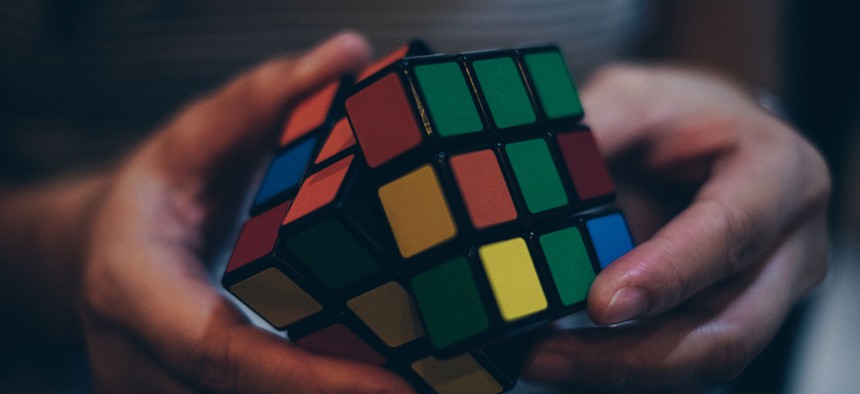
Lisyl / Shutterstock.com
'People Who Boast About Their IQ Are Losers'
Studies say that bragging about your superiority makes people like you less—so what does Donald Trump hope to gain?
In 2004, a New York Times reporter asked Stephen Hawking what his IQ was. “I have no idea,” the theoretical physicist replied. “People who boast about their IQ are losers.”
President Donald Trump seems to think otherwise. After recent reports that Rex Tillerson, his secretary of state, called him a moron, Trump told Forbes: “I think it’s fake news, but if he did that, I guess we’ll have to compare IQ tests. And I can tell you who is going to win.”
As Philip Bump at The Washington Post reported, Trump has a history of boasting about his IQ, and challenging others to IQ tests. His supporters have also taken up this cause for him in the past. In December 2016, a chart made the rounds saying that Trump’s IQ was 156, putting him above most past presidents. (The median score is 100.) The fact-checking website Snopes rated this claim as false: While the chart was based on a real study, the study didn’t have real IQ scores for most presidents (it estimated their IQs based on other factors), Trump wasn’t included in the study, and most importantly,“Donald Trump’s true intelligence quotient is unknown,” the article reads.
Scientists disagree on how useful IQ tests are as a measurement of intelligence. There’s research to show that IQ can change over the lifespan, for example. And some say that it doesn’t account for things like emotional intelligence or creativity. But “IQ” remains an easy shorthand for referring to intelligence, with the added bonus of sounding scientific, quantifiable, and official.
It isn’t totally surprising that Trump seems to think his IQ is exceptional. If asked, most people would say they are smarter than the average person. (They would also likely say they’re more competent, kinder, more honest, and more responsible.) This is a well-studied phenomenon in psychology known as the “better-than-average effect” or “self-enhancement.”
Even so, people might be reluctant to publicize their sense of superiority, because such boasts tend to be poorly received. One study found that while bragging about your own good qualities didn’t necessarily make people dislike you, bragging about yourself in relation to others did. For example, saying “I am a good student” probably wouldn’t bother anybody, but saying “I’m a better student than others” would. Bragging about your better-than-average intelligence, then, would likely make other people think you’re insulting them—and make them feel aggressive toward you as a result.
“We see this consistently, that the claim, at least in this culture, of being above average is just frowned upon,” says Joachim Krueger, a professor of psychology at Brown University who has studied bragging. “There are also conversational norms.” There’s an expectation that your good qualities will reveal themselves over time, without you announcing them.
So if bragging about your intelligence can alienate people, and make you look like a loser (at least to Stephen Hawking), why risk it?
It feels great, for one thing. People love to talk about themselves—to the point that in one study, they turned down money for the opportunity to answer questions about themselves. And the same study found that self-disclosure appears to activate brain regions associated with reward.
They may also miscalculate how others will react to their boasts. One study found that people often self-promote because they’re trying to make a good impression on others. But they tend to overestimate how much their self-promotion will make other people feel happy for them and proud of them, and underestimate how annoying people will find it.
Krueger coauthored a study in 2016 that found bragging about your superiority comes with a tradeoff. It will make people see you as more competent, but less moral—unless the thing you are bragging about is provably false. Then it makes people see you as incompetent and immoral.
In a case like Trump’s brag about being smarter than Tillerson, where the validity of his claim is unknown, the research suggests people would err on the side of believing him.
“My personal opinion of the president’s claims about his own IQ is that he is making a gamble: brag and be thought of as competent (intelligent), and hope that nothing will ever surface that proves his claims wrong,” Patrick Heck, Krueger’s coauthor on the study, told me in an email.
“Of course there won’t be an IQ test given and then the nation will be informed what score he had and what score Tillerson had, so it’s pure rhetoric,” Krueger says. “In the context of our study if there truly were no other information about him, that would be a slight advantage.”
But nobody is evaluating Donald Trump based on this claim and this claim alone. Krueger points out that because opinions of the president are already so polarized, people will likely incorporate this latest brag into their existing views of him. If they think he’s a clever politician and a savvy businessman, they’ll likely take his brag at face value. If they already think he’s incompetent and immoral, an unverified claim about his IQ probably won’t change that.
But what if Trump and Tillerson were actually to throw down—intellectually speaking? Mensa International—a society whose members must prove their IQs are in the top 2 percent of the population—has offered to host an IQ-test showdown between Trump and Tillerson, heaven help us all. What if it really happened? And what if Trump were to lose?
“That’s a crazy hypothetical—you and I know perfectly well that’s not going to happen and Mensa never thought it would happen,” Krueger says. “That's another rhetorical play to throw into the game. But in your hypothetical universe, [if they] take the test and we find that he is 20 points below Tillerson, then according to our study, it would be a false positive and it would be particularly embarrassing.”






